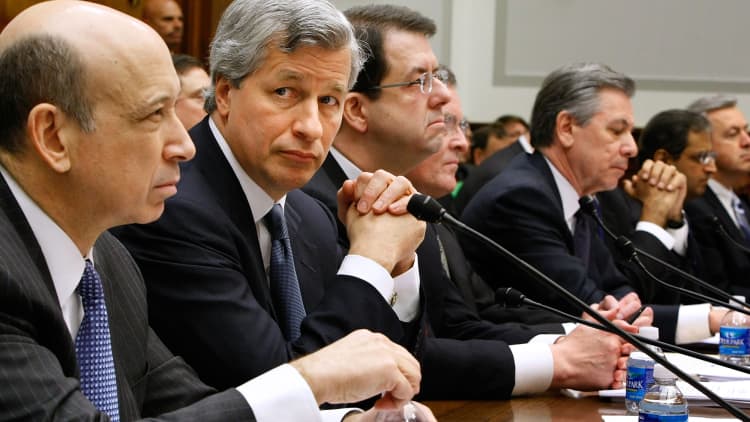President Donald Trump, who ran as a gun-rights advocate, has started to publicly discuss tighter restrictions on firearms following the massacre of 17 people at a Florida high school.
So far he has proceeded carefully, balancing a desire to take action with a desire to keep his political base happy. This week, the president has pushed mostly for modest steps already backed by the National Rifle Association — which is a powerful influence among gun owners in many of the areas that propelled Trump to the presidency.
While Trump's support gives Republicans in Congress more cover to pass narrow gun control measures, it is unclear what action lawmakers will take following the latest in a string of mass shootings, including last week's rampage at Marjory Stoneman Douglas High School in Parkland, Florida. Pressure has increased this week amid widely followed protests and calls for action from students at the school.
Trump may provide more detail on his gun control stance on Wednesday afternoon. The president is scheduled to host a listening session with students, teachers and parents involved in the Florida shooting as well as the 2012 massacre at Sandy Hook Elementary School in Connecticut and the 1999 mass shooting at Columbine High School in Colorado.
On Tuesday, Trump signed a memorandum recommending that Attorney General Jeff Sessions propose rules banning so-called bump stocks, which can effectively turn semi-automatic weapons into machine guns. The gunman who massacred more than 50 people at a concert in Las Vegas last year used such a device.
White House press secretary Sarah Huckabee Sanders also told reporters Trump is open to supporting a bipartisan Senate bill to close holes in the current background check system. It aims to make federal agencies better at following rules that require them to submit criminal convictions to the FBI, which could help stop high-risk individuals from getting guns.
Last year, the Air Force said it had not submitted records that could have stopped the shooter who killed 26 people at a church in Sutherland Springs, Texas, from buying a gun.
"Whether we are Republican or Democrat, we must now focus on strengthening Background Checks!" Trump tweeted on Tuesday.
After the Vegas massacre, the NRA said it backed a ban on bump stocks. The organization's legislative arm also signaled its support for the background check policy — though as part of a broader House-passed bill that would allow individuals who have concealed carry permits in one state to carry nationwide.
The White House has also publicly or privately floated some gun rules that could draw the NRA's ire.
On Tuesday, Sanders did not rule out Trump's support for an assault weapons ban, saying "we haven't closed the door on any front." The gunman in Florida and multiple other mass shooters have used some variation of a semi-automatic rifle like the AR-15.
The NRA opposes the policy. The organization tweeted a link Tuesday saying a previous assault weapons ban that expired in 2004 did not contribute to a decrease in crime.
A 2004 report commissioned by the Justice Department's research arm, however, concluded that the effects of a 1994 ban were "mixed" and "still unfolding" at the time it expired, according to FactCheck.org.
While the ban reduced crimes with assault weapons, the use of other, still legal semi-automatic weapons with large-capacity magazines increased, the report said. Therefore, the report stopped short of attributing a drop in U.S. gun violence to the assault weapons ban.
On Tuesday, Sanders also said age restrictions for buying rifles like the AR-15 are "on the table." The NRA's legislative arm did not immediately comment on where it stood on possible age restrictions.
Where Congress goes from here
Two pieces of gun legislation may see a vote in Congress: the bill to strengthen background checks, and a proposal to ban bump stocks. As of now, the background check legislation appears to have more traction.
Congress is on recess this week and cannot take any immediate action. It is unclear what can get done this year, as many lawmakers will spend large chunks of the year outside of Washington campaigning for November's midterm elections.
Champions of the background check bill, Senate Majority Whip John Cornyn, R-Texas, and Sen. Chris Murphy, D-Conn., cheered Trump's decision to support it this week. It appears to have the support to pass at least the Senate as a stand-alone bill. Senate Democrats would likely oppose the concealed carry reciprocity proposal approved by the House.
Bump stock legislation may have a tougher path than the background check bill because it so far has not gained as much bipartisan momentum. Any rule to ban the devices put forth by the Justice Department could face legal challenges and may only serve as a temporary fix.
Murphy, who previously represented the congressional district where 20 children and six adults were killed at school in Newtown, Connecticut, in 2012, argued this week that the bipartisan background check bill alone does not go far enough.
Gun control policy could feature in the fight for control of Congress in November. Republicans, who have often cautioned against new gun regulations after mass shootings, will try to hold their edge in both chambers of Congress.
Democrats, who generally favor more restrictions on guns, will attempt to win majorities in both the House and Senate.
A Quinnipiac poll released Tuesday found two-thirds of American voters favored tighter gun restrictions. Among its findings, it said 97 percent of voters back universal background checks and 67 percent of voters support an assault weapons ban.



